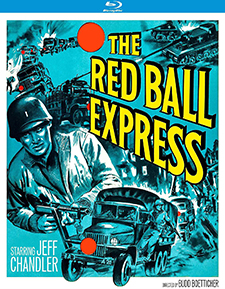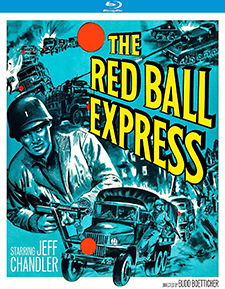Red Ball Express, The (Blu-ray Review)

Director
Budd BoetticherRelease Date(s)
1952 (August 18, 2020)Studio(s)
Universal Pictures (Kino Lorber Studio Classics)- Film/Program Grade: B-
- Video Grade: B+
- Audio Grade: B
- Extras Grade: B-
Review
The Red Ball Express is a behind-the-lines war tale of a 1944 truck convoy assembled to deliver emergency supplies of gas and ammunition to Gen. George S. Patton’s rapidly advancing tank corps in France during World War II. A pre-title card prologue fills us in on the reason for the rush. Patton’s forces advanced against the enemy much faster than anticipated and the supply chain didn’t keep up. Now the tanks are out of gas, the weapons are out of ammo, and the men are sitting ducks. “Red Ball Express” is a railroad term for a freight train carrying high-priority cargo.
Lt. Chick Campbell (Jeff Chandler) is put in command of a group of soldiers who will load and drive the trucks as quickly as possible to keep Patton’s forces supplied as they push on toward Paris. Sgt. Red Kallek (Alex Nicol) is assigned to be Campbell’s second in command. There is bad blood between them over an incident in their past, but the two men are forced to cooperate to get their arduous task accomplished. Some of their men have a good deal of experience driving trucks, others have none.
Directed by Budd Boetticher, the film is a fictionalized account of an actual post-D-Day mission to deliver supplies to the allies. There are few combat scenes, and most of the tension derives from how the men deal with muddy roads, exhaustion, minefields, and personal grudges and prejudices. Some men complain, others question the mission, and others simply do their part. It’s not a glamourous mission, and this is shown by men nodding off behind the wheel, lugging heavy gas cans onto trucks, and constantly fighting the clock.
The supporting cast includes Charles Drake, Sidney Poitier, Hugh O’Brien, and Jack Kelly. A camaraderie develops among the men. They all think their mission is far less meaningful than fighting at the front. But the drudgery they face day after day and Campbell’s leadership eventually pay off as they recognize their importance to the military advance. The film touches gingerly on racial disharmony, but it is not a major theme and is focused primarily on Robertson (Poitier), a sensitive soldier.
Boetticher succeeds in delineating several characters while keeping the convoy constantly moving. Several scenes involving women slow the pace. A couple of Red Cross nurses pop up in a few places, more to add feminine charm than to move the plot along. Pvt. Partridge (Drake) “meets cute” an attractive young French woman (Jacqueline Duval), and their flirtations draw attention away from the convoy, padding the narrative rather than strengthening it. These scenes serve only to boost the running time to a still modest 83 minutes.
Featuring 1080p resolution, The Red Ball Express is presented by Kino Lorber Studio Classics in the aspect ratio of 1.37:1. The picture does not have any scratches, cue marks, dirt specks, or jump cuts. The blacks are rich and the small-screen format often seems more expansive because of the placement of actors, vehicles, and constant movement within the frame. Compositions are dense and give the impression of more men than actually appear on screen. Memorable scenes include the trucks plowing through mud during a downpour and the trucks, filled with gas cans, moving through a city in flames. Unlike many war films made at the time, the focus is on the men and their trials and tribulations fulfilling a tough mission rather than on the good guys fighting the Nazis.
The soundtrack is English Mono DTS-High Definition Master Audio. English SDH subtitles are available as well. Dialogue is clear and distinct throughout, with Chandler’s deep voice particularly suitable to a man in command. The sound of truck engines never overpowers conversations even though they are heard during much of the film. Language is appropriate for a bunch of guys under orders to hustle 24/7. The limited machine gunfire sounds tinny, while the rifle fire is more authentic. The score is compiled from various stock sources, including music by composers Hans J. Salter, Walter Scharf, Frank Skinner, and others. More appropriate for a high school pep rally than a motion picture, the music is intrusive and distracting.
Bonus materials include an audio commentary and six trailers.
Audio Commentary – Filmmaker/historian Steve Mitchell and Combat Films: American Realism author Steven Jay Rubin collaborated on this commentary. The prologue features a stock footage montage including shots of Gen. George S. Patton. The film does not contain a lot of combat action and is more “a road picture times ten.” Screenwriter John Michael Hayes and director Boetticher provide good character definition. The beginning of the film is “quite snappy.” The film has no main title sequence, only a title card about seven minutes into the film. The supporting cast includes Hugh O’Brien and Jack Kelly, who would both achieve fame on TV as Wyatt Earp and Bart Maverick, respectively. In the 1950s, TV was a threat to the motion picture industry and the studios turned to the widescreen format to compete. Even though The Red Ball Express was shot in the 1.37:1 aspect ratio, Boetticher creates a sense of spectacle in a modest way by filling the frame with actors, trucks, and dense formations, giving the movie “size.” The character of Gen. Gordon (Howard Petrie) is based on Patton. Jeff Chandler, who had been a radio actor, was extremely popular during the 1950s. James Edwards (Home of the Brave) was originally cast as Robertson, but ran afoul of the House Un-American Activities Committee when he refused to answer their questions and was fired from the film. Poitier stepped in, marking his fourth feature film appearance. The movie is essentially the story of beating the clock. Universal made only four war pictures during the 1950s. Had the film stayed with the men, the convoy, and the obstacles they face, the picture would have been stronger.
Trailers – The following six trailers are included: Wake Island, Fixed Bayonets!, Time Limit, Ten Seconds to Hell, Run Silent, Run Deep, and Man in the Shadow.
– Dennis Seuling

